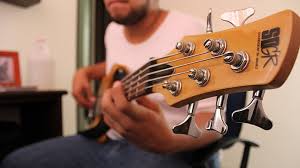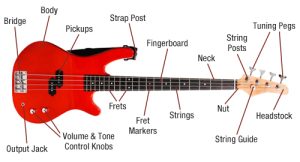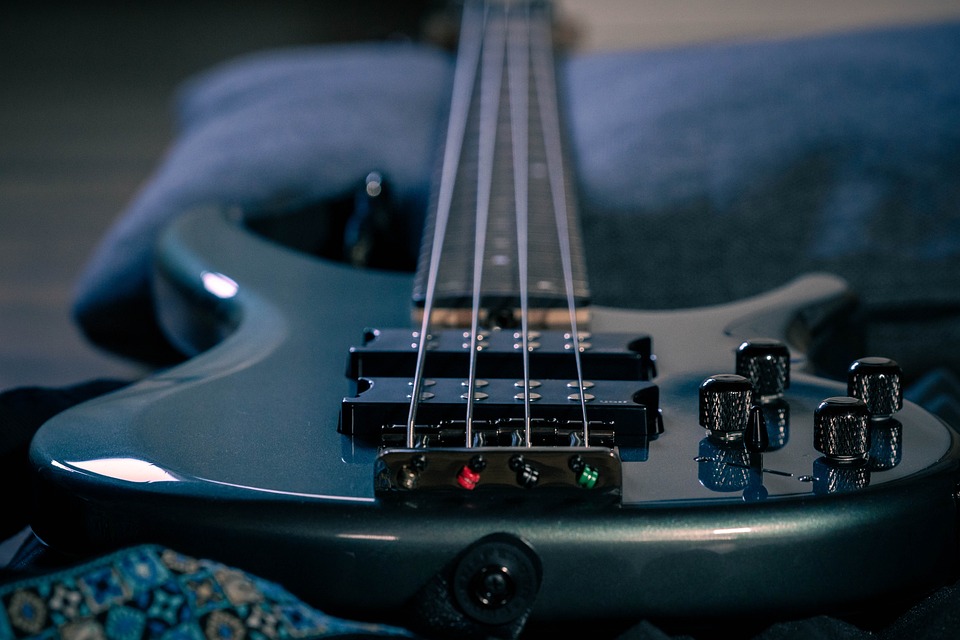LEARN HOW TO PLAY BASS GUITAR

Bass guitar is an essential component of many musical genres, including rock, jazz, and funk. The bass guitar provides the foundation of the music, helping to establish the rhythm and create a groove. If you’re interested in learning how to play bass guitar, you’re in luck – it’s an incredibly rewarding instrument to master. In this guide, we’ll cover everything you need to know to get started playing bass guitar, from the basics of how to hold the instrument to more advanced techniques.
Choosing Your bass guitar

Before you start playing bass guitar, you’ll need to choose an instrument that’s right for you. There are a few factors to consider when selecting a bass guitar, including the style of music you want to play, your budget, and your skill level. Here are some tips to help you choose the right bass guitar:
- Consider the style of music you want to play: Different styles of music require different types of bass guitars. For example, if you want to play funk or slap bass, you’ll need a bass guitar with a bright, punchy sound. If you want to play rock or metal, you’ll want a bass guitar with a thicker, more aggressive sound.
- Set a budget: Bass guitars can range from a few hundred dollars to several thousand dollars. Decide how much you’re willing to spend before you start shopping.
- Try out different bass guitars: If possible, try out a few different bass guitars before you make a purchase. This will give you a better sense of what type of instrument feels comfortable and sounds good to you.
The Parts of a Bass Guitar

Before you start playing bass guitar, it’s helpful to familiarize yourself with the different parts of the instrument. Here’s a quick overview:
- Neck: The neck is the long, thin part of the bass guitar that you hold onto to play the instrument. It’s typically made of wood and is attached to the body of the guitar.
- Fretboard: The fretboard is the flat surface on the neck of the bass guitar that contains the frets.
- Frets: The frets are the metal strips on the fretboard that divide it into different notes. When you press down on a fret, it changes the pitch of the string.
- Strings: The strings are the long, thin wires that run along the length of the bass guitar. They’re typically made of metal and are tuned to different pitches.
- Bridge: The bridge is part of the bass guitar that anchors the strings to the body of the instrument.
- Pickups: The pickups are the magnets on the body of the bass guitar that capture the sound of the strings and send it to the amplifier.
Holding and Playing the Bass Guitar

Now that you’re familiar with the different parts of the bass guitar, it’s time to start playing! Here are the basic steps for holding and playing the bass guitar:
- Sit down with the bass guitar: It’s best to start playing the bass guitar while seated. Sit on a chair or stool that allows you to keep your back straight and your feet flat on the ground. Rest the bass guitar on your lap, with the neck of the guitar pointing upward.
- Hold the bass guitar with your left hand: Place your left hand on the neck of the bass guitar, with your thumb resting on the back of the neck. Your fingers should be on the fretboard, with your fingertips just behind the frets.
- Hold the bass guitar with your right hand: Place your right hand on the body of the bass guitar, with your thumb resting on the strings near the bridge. Your fingers
10 Steps to playing bass guitar
- Learn the basics of music theory: Before you can play bass guitar, it’s important to understand the fundamentals of music theory. This includes concepts like scales, chords, and rhythm.
- Get comfortable holding the bass guitar: As mentioned earlier, holding the bass guitar properly is crucial for playing it effectively. Take some time to get comfortable holding the instrument before you start playing.
- Learn how to tune your bass guitar: Tuning your bass guitar is an essential step before you can start playing it. Use a tuner or online resource to help you tune your bass guitar.
- Practice basic techniques: Start by practicing basic techniques like plucking (also known as “picking”) the strings with your fingers or using a pick. This will help you develop a solid foundation for more advanced techniques.
- Learn how to read bass guitar tabs: Bass guitar tabs are a type of musical notation that tells you which notes to play. Spend some time learning how to read bass guitar tabs so you can play along with your favorite songs.
- Practice scales and arpeggios: Scales and arpeggios are basic building blocks of music, and practicing them will help you develop your finger dexterity and hand-eye coordination.
- Learn some basic bass lines: Bass lines are the foundational melodies that underpin a song. Practice playing some basic bass lines to get a feel for how the bass guitar fits into different musical genres.
- Practice playing with a metronome: Keeping time is essential for playing bass guitar effectively. Use a metronome or drum machine to practice playing in time with a steady beat.
- Join a band or find other musicians to play with: Playing with other musicians is a great way to improve your skills and learn new techniques. Look for opportunities to join a band or find other musicians to jam with.
- Keep practicing: As with any instrument, the key to getting better at playing bass guitar is to keep practicing regularly. Aim to practice for at least 30 minutes every day, and focus on developing your technique and learning new songs and techniques.
Questions people ask while trying to learn guitar;
- How can I teach myself to play the bass guitar
- Is it easy to learn the bass guitar
- What should a beginner learn on bass
- How hard is learning to play the bass guitar
1. How can I teach myself to play bass guitar?
Teaching yourself how to play bass guitar is definitely possible, and it can be a rewarding and fulfilling experience. Here are some steps you can take to teach yourself how to play bass guitar:
- Get the right equipment: To start playing bass guitar, you’ll need to get a bass guitar and an amplifier. There are many different types of bass guitars and amplifiers to choose from, so do some research to find the right equipment for your needs and budget.
- Learn the basics of music theory: As mentioned earlier, understanding the basics of music theory is crucial for playing bass guitar effectively. This includes concepts like scales, chords, and rhythm. There are many resources available online that can help you learn music theory, such as instructional videos and articles.
- Find instructional materials: There are many instructional materials available that can help you learn how to play bass guitar, including books, videos, and online courses. Look for materials that are geared towards beginners and that cover the basics of bass guitar playing.
- Practice regularly: Consistent practice is key to becoming proficient at playing bass guitar. Set aside time each day to practice, even if it’s just for a few minutes. You can start with simple exercises like practicing finger placement and scales.
- Learn from other musicians: Watching other musicians play bass guitar can be a great way to learn new techniques and improve your playing. Look for videos of bass guitarists playing your favorite songs or performing live, and try to emulate their playing style.
- Join online communities: There are many online communities of bass guitar players that you can join to connect with other musicians, ask for advice, and share your progress. These communities can be a great source of motivation and inspiration as you learn to play bass guitar.
- Be patient and persistent: Learning to play bass guitar takes time and practice, so be patient with yourself and don’t get discouraged if you don’t see progress right away. Keep practicing regularly and focus on improving your technique and skills over time.
By following these steps and putting in the time and effort to practice regularly, you can teach yourself how to play bass guitar and become a skilled and confident player.
2. Is it easy to learn the bass guitar?
Learning the bass guitar can be challenging, especially if you’re new to playing a musical instrument. However, with regular practice and dedication, it’s definitely possible to become proficient at playing bass guitar. Here are some factors to keep in mind when considering whether or not a bass guitar is easy to learn:
- Prior musical experience: If you’ve played another instrument before, you may find it easier to learn bass guitar, as you’ll already have some understanding of music theory and playing technique.
- Natural ability: Some people may find that they have a natural talent for playing bass guitar, making it easier for them to learn and progress quickly.
- Time commitment: Like any new skill, learning bass guitar requires time and practice. If you’re willing to dedicate time each day to practicing and learning, you’ll likely find it easier to make progress.
- Patience and persistence: Learning any new skill can be frustrating at times, but having patience and persistence is key to overcoming challenges and making progress.
Ultimately, whether or not a bass guitar is easy to learn depends on a variety of factors, including your prior musical experience, natural ability, and dedication to practice. While it may take time and effort to become proficient at playing bass guitar, with regular practice and a willingness to learn, it’s definitely possible to become a skilled player.
3. What should a beginner learn on bass?
As a beginner on bass guitar, it’s important to start with the basics and gradually work your way up to more advanced techniques. Here are some essential skills and concepts that beginners should focus on:
- Proper technique: Learning proper technique is essential for developing good habits and preventing injury. This includes holding the bass guitar correctly, using proper hand and finger placement, and developing a comfortable playing position.
- Basic music theory: Understanding the basics of music theory, such as scales, chords, and rhythm, is important for playing bass guitar effectively. This knowledge will help you to create bass lines that fit well with the other instruments in a song.
- Playing simple bass lines: Practice playing simple bass lines to develop your sense of rhythm and timing. Focus on playing the notes cleanly and evenly, and try to maintain a steady tempo.
- Finger exercises: Exercises that focus on finger strength, dexterity, and coordination are important for developing good technique and improving your playing ability.
- Learning songs: Practice learning songs that you enjoy and that are within your skill level. This will help you to apply the skills and techniques you’ve learned in a practical way, and it can be a great source of motivation and enjoyment.
- Playing with others: Playing with other musicians, whether in a band or jam session, can be a great way to develop your skills and gain experience in a group setting.
By focusing on these essential skills and concepts, beginners can develop a strong foundation for playing bass guitar and progress towards more advanced techniques and playing styles over time.
4. How hard is learning to play the bass guitar?
Learning to play the bass guitar can be challenging, especially if you’re new to playing a musical instrument. However, with dedication, practice, and a willingness to learn, it’s definitely possible to become proficient at playing bass guitar. Here are some factors to consider when thinking about how hard it is to learn to play the bass guitar:
- Prior musical experience: If you have prior experience playing another instrument, you may find it easier to learn bass guitar, as you’ll already have some understanding of music theory and playing technique.
- Natural ability: Some people may find that they have a natural talent for playing bass guitar, making it easier for them to learn and progress quickly.
- Time commitment: Like any new skill, learning bass guitar requires time and practice. If you’re willing to dedicate time each day to practicing and learning, you’ll likely find it easier to make progress.
- Patience and persistence: Learning any new skill can be frustrating at times, but having patience and persistence is key to overcoming challenges and making progress.
- The complexity of playing techniques: Depending on the style of music you want to play, bass guitar playing can involve complex techniques like slap and pop, fingerstyle, or tapping. These techniques can take time and practice to master and may be more difficult for some beginners than others.
Ultimately, the level of difficulty of learning bass guitar depends on a variety of factors, including your prior musical experience, natural ability, dedication to practice, and the complexity of the techniques involved. While it may take time and effort to become proficient at playing bass guitar, with regular practice and a willingness to learn, it’s definitely possible to become a skilled player.
Wait, Before You GO!!!
Click to Download other Latest gospel songs
